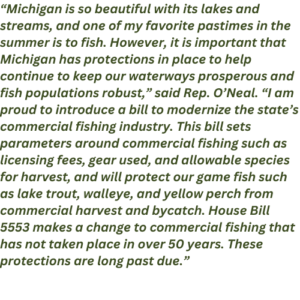MUCC Supported Commercial Fishing Legislation Introduced in Michigan House
On March 6, Rep. Amos O’Neal (D-Saginaw) introduced a stakeholder-backed modernization of Michigan’s commercial fishing statute.
House Bill 5553 , written over the past several months in partnership with MUCC, would modernize archaic regulations in the state’s commercial fishing statute, and keep gamefish out of commercial nets.
Michigan’s commercial fishing statute is decades old and an update is long overdue to protect the pristine Great Lakes fishery, said Amos O’Neal.
“Michigan is so beautiful with its lakes and streams, and one of my favorite pastimes in the summer is to fish,” said Rep. O’Neal. “I am proud to introduce a bill to modernize the state’s commercial fishing industry. House Bill 5553 makes a change to commercial fishing that has not taken place in over 50 years. These protections are long past due.”
According to MUCC Policy and Government Affairs Manager Justin Tomei, the current commercial fishing statute needs to be revised protecting the investment licensed anglers have made in the management of our sportfish.

“Currently we operate with an abhorrent patchwork of rules and regulations, many of them have not been updated since the 1970s,” said Tomei. “We must modernize this industry, create a single regulatory framework in statute, and keep gamefish out of commercial nets, protecting the investment licensed anglers have made managing and rearing these fish.”
The bill has been assigned to the House Committee on Natural Resources, Environment, Tourism, and Outdoor Recreation.
HB 5553 starkly contrasts HB 5108, introduced by Rep. Jason Morgan (D-Ann Arbor) last fall. HB 5108 sets minimum quotas for gamefish to be caught by state-licensed commercial anglers, commercializing a resource held in the public trust.
MUCC opposes HB 5108 and started a call to action resulting in 85,000 emails being sent to legislative offices in opposition to the commercialization of Michigan’s game fish.
MUCC supports HB 5553 and looks forward to working with legislators to secure passage in 2024.
To ensure our natural resources remain protected and managed thoughtfully and our outdoor heritage defended, join Michigan United Conservation Clubs today: http://bit.ly/JoinMUCC .
The post MUCC Supported Commercial Fishing Legislation Introduced in Michigan House appeared first on Michigan United Conservation Clubs.
Recent Posts



